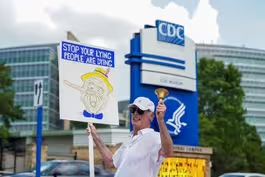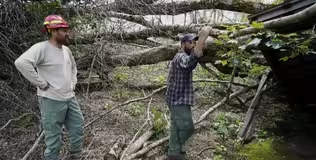
WFP director on the humanitarian crisis, starvation in Sudan
Clip: 8/31/2025 | 4m 14sVideo has Closed Captions
WFP director Cindy McCain on the humanitarian crisis, starvation in Sudan
The International Rescue Committee estimates that worldwide, countries with about 11% of the world’s population account for a staggering 82% of people needing humanitarian aid. William Brangham spoke with Cindy McCain, director of the United Nations’ World Food Program, about what’s happening in Sudan, where the world’s largest — and often overlooked — humanitarian crisis is unfolding.
Problems playing video? | Closed Captioning Feedback
Problems playing video? | Closed Captioning Feedback
Major corporate funding for the PBS News Hour is provided by BDO, BNSF, Consumer Cellular, American Cruise Lines, and Raymond James. Funding for the PBS NewsHour Weekend is provided by...

WFP director on the humanitarian crisis, starvation in Sudan
Clip: 8/31/2025 | 4m 14sVideo has Closed Captions
The International Rescue Committee estimates that worldwide, countries with about 11% of the world’s population account for a staggering 82% of people needing humanitarian aid. William Brangham spoke with Cindy McCain, director of the United Nations’ World Food Program, about what’s happening in Sudan, where the world’s largest — and often overlooked — humanitarian crisis is unfolding.
Problems playing video? | Closed Captioning Feedback
How to Watch PBS News Hour
PBS News Hour is available to stream on pbs.org and the free PBS App, available on iPhone, Apple TV, Android TV, Android smartphones, Amazon Fire TV, Amazon Fire Tablet, Roku, Samsung Smart TV, and Vizio.
Providing Support for PBS.org
Learn Moreabout PBS online sponsorshipCindy McCain, I just want to ask you a little bit about what is happening in Sudan, which while many eyes are on Gaza, Sudan is perhaps an even greater circumstance there.
We know that 14 million people and more have been displaced.
It is one of the worst crises in the world today.
Can you tell us a little bit about what is going on there from your point of view?
Well, it is, as you just said, the largest humanitarian crisis on the planet.
And uh you have people being pushed back and forth by the various factions that are happening, combined with what we call the lean season, which brings huge amounts of rains, which are also devastating.
And you've got the rebels roaming around making sure that people can't eat.
There is famine in Sudan, and quite frankly, the world isn't paying attention to it at all.
The focus is on Gaza and I wish people would pay closer attention also to Sudan and to South Sudan.
Are you able to operate there in any capacity that that you feel is sufficient?
Well, we're operating but not as what I feel is sufficient.
uh we are operating.
It is as you know is very challenging there not just because of the the political elements and all the elements that are causing uh so much of this but also from a from a just an operational standpoint trying to get trucks in and trying to get uh the commodities in that we need to do.
the Darur region is devastated from all this and so it's it's imperative that we push for this these the funding cuts have really really had a a real damper on all this because we do need money to be able to operate there and we don't have it the way we used to but we cannot forget this region we cannot forget these people either and as I said they are they're there they're it's devastating there uh what's happening and what what could happen if we don't get more aid in UNICEF recently ly said that after these 500 days of siege that children in Alfasure in particular are suffering, mass displacement, deadly violence still going on.
Are you able to operate in that region specifically?
We're Yes, we're in in se several of the regions, more than several actually.
Uh but I'll be honest with you, it depends on the day.
It depends on, you know, what's happening from a security standpoint around there.
We do the very best we can.
As I've said before, our people are extraordinarily good at what they do and they're very experienced in these particular regions.
So, we can do the things, you know, we we do get in.
We don't get in enough.
As I said, in some cases, we don't get in at all.
It just depends on the region and depends on the day many times.
I mean, apart from the violence coming to an end there, and I know that's something that you and few other even governments have any control over, what else do you need to have happen there in order to help all of these these desperate people?
Well, we need to be able to get food in at scale as I mentioned and not just in that in the Darurel Fashier region, but all around the country.
people are just don't have access and because of the influence of climate change and all the other elements that I mentioned earlier uh they don't have the ability to to really be resilient and grow their own food in many cases.
So it's kind of a perfect storm of disaster in terms of the inability for these people to function in a normal way with regards to food and and be able to to move around in in normal ways.
We'd like everything we need to get in.
Get in.
Make sure we can feed at scale and make sure that we can continue to feed at scale.
It's devastating to watch.
The children are the most vulnerable in all of this.
All right, that is Cindy McCain, the head of the World Food Program.
Thank you so much for being here.
Thank you.
My pleasure.
CDC in turmoil as RFK Jr. eyes major vaccine policy changes
Video has Closed Captions
Clip: 8/31/2025 | 6m 30s | Inside the CDC turmoil as RFK Jr. eyes sweeping vaccine policy changes (6m 30s)
Volunteers restore Appalachian Trail after Hurricane Helene
Video has Closed Captions
Clip: 8/31/2025 | 3m 33s | Volunteers work to restore the Appalachian Trail after Helene’s destruction (3m 33s)
What to know about ‘AI psychosis’ from talking to chatbots
Video has Closed Captions
Clip: 8/31/2025 | 6m 22s | What to know about ‘AI psychosis’ and the effect of AI chatbots on mental health (6m 22s)
Providing Support for PBS.org
Learn Moreabout PBS online sponsorship
- News and Public Affairs

FRONTLINE is investigative journalism that questions, explains and changes our world.

- News and Public Affairs

Today's top journalists discuss Washington's current political events and public affairs.












Support for PBS provided by:
Major corporate funding for the PBS News Hour is provided by BDO, BNSF, Consumer Cellular, American Cruise Lines, and Raymond James. Funding for the PBS NewsHour Weekend is provided by...


